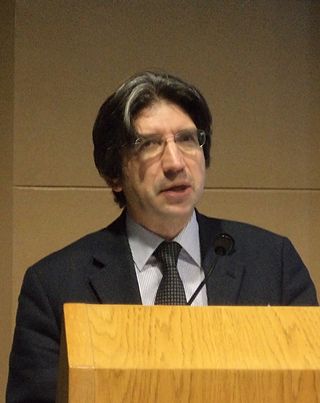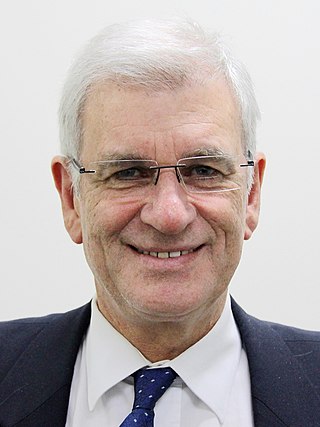Bipolar I disorder is a type of bipolar spectrum disorder characterized by the occurrence of at least one manic episode, with or without mixed or psychotic features. Most people also, at other times, have one or more depressive episodes. Typically, these manic episodes can last at least 7 days for most of each day to the extent that the individual may need medical attention, while the depressive episodes last at least 2 weeks.

Major depressive disorder (MDD), also known as clinical depression, is a mental disorder characterized by at least two weeks of pervasive low mood, low self-esteem, and loss of interest or pleasure in normally enjoyable activities. Introduced by a group of US clinicians in the mid-1970s, the term was adopted by the American Psychiatric Association for this symptom cluster under mood disorders in the 1980 version of the Diagnostic and Statistical Manual of Mental Disorders (DSM-III), and has become widely used since. The disorder causes the second-most years lived with disability, after lower back pain.
A mental disorder, also referred to as a mental illness, a mental health condition, or a psychiatric disability, is a behavioral or mental pattern that causes significant distress or impairment of personal functioning. A mental disorder is also characterized by a clinically significant disturbance in an individual's cognition, emotional regulation, or behavior, often in a social context. Such disturbances may occur as single episodes, may be persistent, or may be relapsing–remitting. There are many different types of mental disorders, with signs and symptoms that vary widely between specific disorders. A mental disorder is one aspect of mental health.

A mood stabilizer is a psychiatric medication used to treat mood disorders characterized by intense and sustained mood shifts, such as bipolar disorder and the bipolar type of schizoaffective disorder.

A mood disorder, also known as an affective disorder, is any of a group of conditions of mental and behavioral disorder where the main underlying characteristic is a disturbance in the person's mood. The classification is in the Diagnostic and Statistical Manual of Mental Disorders (DSM) and International Classification of Diseases (ICD).

Seasonal affective disorder (SAD) is a mood disorder subset in which people who typically have normal mental health throughout most of the year exhibit depressive symptoms at the same time each year. It is commonly, but not always, associated with the reductions or increases in total daily sunlight hours that occur during the summer or winter.
Schizoaffective disorder is a mental disorder characterized by symptoms of both schizophrenia (psychosis) and a mood disorder - either bipolar disorder or depression. The main diagnostic criterion is the presence of psychotic symptoms for at least two weeks without prominent mood symptoms. Common symptoms include hallucinations, delusions, disorganized speech and thinking, as well as mood episodes. Schizoaffective disorder can often be misdiagnosed when the correct diagnosis may be psychotic depression, bipolar I disorder, schizophreniform disorder, or schizophrenia. This is a problem as treatment and prognosis differ greatly for most of these diagnoses. Many people with schizoaffective disorder have other mental disorders including anxiety disorders.

Depression is a mental state of low mood and aversion to activity. It affects about 3.5% of the global population, or about 280 million people of all ages. Depression affects a person's thoughts, behavior, feelings, and sense of well-being. Experiences that would normally bring a person pleasure or joy gives reduced pleasure or joy, and the afflicted person often experiences a loss of motivation or interest in those activities.

The Institute of Psychiatry, Psychology & Neuroscience (IoPPN) is a centre for mental health and neuroscience research, education and training in Europe. It is dedicated to understanding, preventing and treating mental illness, neurological conditions, and other conditions that affect the brain. The IoPPN is a faculty of King's College London, England, and was previously known as the Institute of Psychiatry (IoP).

Dan Joseph Stein is a South African psychiatrist who is a professor and Chair of the Dept of Psychiatry and Mental Health at the University of Cape Town, and Director of the South African MRC Unit on Risk & Resilience in Mental Disorders. Stein was the Director of UCT's early Brain and Behaviour Initiative, and was the inaugural Scientific Director of UCT's later Neuroscience Institute. He has also been a visiting professor at Mount Sinai School of Medicine in the United States, and at Aarhus University in Denmark.

Stephen Vincent Faraone is an American psychologist who is a distinguished professor of psychiatry, physiology and neuroscience at SUNY Upstate Medical University and president of the World Federation of ADHD. Involved in research since 1978, he is an expert on attention-deficit hyperactivity disorder (ADHD) and related disorders and is considered one of the most influential psychologists in the world.

Dennis S. Charney is an American biological psychiatrist and researcher, with expertise in the neurobiology and treatment of mood and anxiety disorders. He is the author of Neurobiology of Mental Illness, The Physician's Guide to Depression and Bipolar Disorders and Molecular Biology for the Clinician, as well as the author of over 600 original papers and chapters. In 2022, he was listed #49 on Research.com's "Top Medicine Scientists in the United States," with an h-index of 218 with 173,960 citations across 887 publications. Charney is known for demonstrating that ketamine is effective for treating depression. Ketamine's use as a rapidly-acting anti-depressant is recognized as a breakthrough treatment in mental illness.
Steven Edward Hyman is Director of the Stanley Center for Psychiatric Research at the Broad Institute of MIT and Harvard in Cambridge, Massachusetts. He is also Harvard University Distinguished Service Professor of Stem Cell and Regenerative Biology. Hyman was Provost of Harvard University from 2001 to 2011 and before that Director of the U.S. National Institute of Mental Health (NIMH) from 1996 to 2001. Hyman received the 2016 Rhoda and Bernard Sarnat International Prize in Mental Health from the National Academy of Medicine for "leadership in furthering understanding and treatment of psychiatric disorders as biological diseases".

Philip Manley Boyce is an Australian psychiatrist. He is an Emeritus Professor of Psychiatry at the University of Sydney and an Emeritus Consultant in Psychiatry at Westmead Hospital. He was a professor of psychiatry and head of discipline of psychiatry at the University of Sydney, and head of Perinatal Psychiatry Clinical Research Unit at Westmead Hospital. He has published more than 350 articles, and frequently contributes to psychiatric textbooks. He served as associate editor of Australian and New Zealand Journal of Psychiatry. He has a long clinical and research interest in anxiety disorders, mood disorders, psychosomatic disorders, and perinatal psychiatry. He has also taken leadership roles in the profession as president of the RANZCP and the international Marcé society, in the development of clinical practice guidelines, and in the development of a competency-based training program for the college.

Eduard Vieta Pascual is a Catalan psychiatrist from Spain known for his work in the field of mood disorders. His unit is a world reference in clinical care, research and teaching of bipolar disorder and depression.

Lori Altshuler was a professor at the University of California, Los Angeles (UCLA) Department of Psychiatry and Biobehavioral Sciences and held the Julia S. Gouw Endowed Chair for Mood Disorders. Altshuler was the Director of the UCLA Mood Disorders Research Program and the UCLA Women's Life Center, each being part of the Neuropsychiatric Hospital at UCLA.
Elisabeth Binder is a medical doctor and neuroscientist specializing in the study of mood and anxiety disorders. She is the director of the Department of Translational Research of the Max Planck Institute of Psychiatry in Munich, Germany. In addition to research, she serves as Vice-President of the European College of Neuropsychopharmacology (ECNP) and is a member of the Executive Committee.
Mary Louise Phillips is a Distinguished Professor in Psychiatry and Clinical and Translational Science, a Pittsburgh Foundation Emmerling Endowed Chair in Psychotic Disorders, Director of the Center for Neural Circuit-Based Technology Interventions in Psychiatry and the Center for Research in Translational and Developmental Affective Neuroscience, Director of the Collaborative on Mood Disorders Research, and Director of the Mood and Brain Laboratory - Department of Psychiatry, University of Pittsburgh. As the director of the Mood and Brain Laboratory, Phillips performs neuroimaging research designed to elucidate the neuropathophysiological basis of bipolar disorders and associated behavioral traits.
Heather Clare Whalley is a Scottish scientist. She is a Professor of Neuroscience and Mental Health neuroimaging at the Centre for Clinical Brain Sciences, University of Edinburgh, and is an affiliate member of the Centre for Genomic and Experimental Medicine at the University of Edinburgh. Her main focus of research is on the mechanisms underlying the development of major psychiatric disorders using the latest genomic and neuroimaging approaches.
Mauricio Tohen is a Mexican American research psychiatrist, Distinguished Professor, and Chairman of the Department of Psychiatry & Behavioral Sciences at the University of New Mexico. Tohen's research has focused on the epidemiology, outcome, and treatment of bipolar and psychotic disorders, and is especially known for innovating the design of clinical trials and the criteria to determine outcome in such diseases. Tohen has edited several books on his specialties. His social awareness has been noted in the promotion of programs to improve mental health care in areas such as substance abuse, bipolar disorder and schizophrenia.












